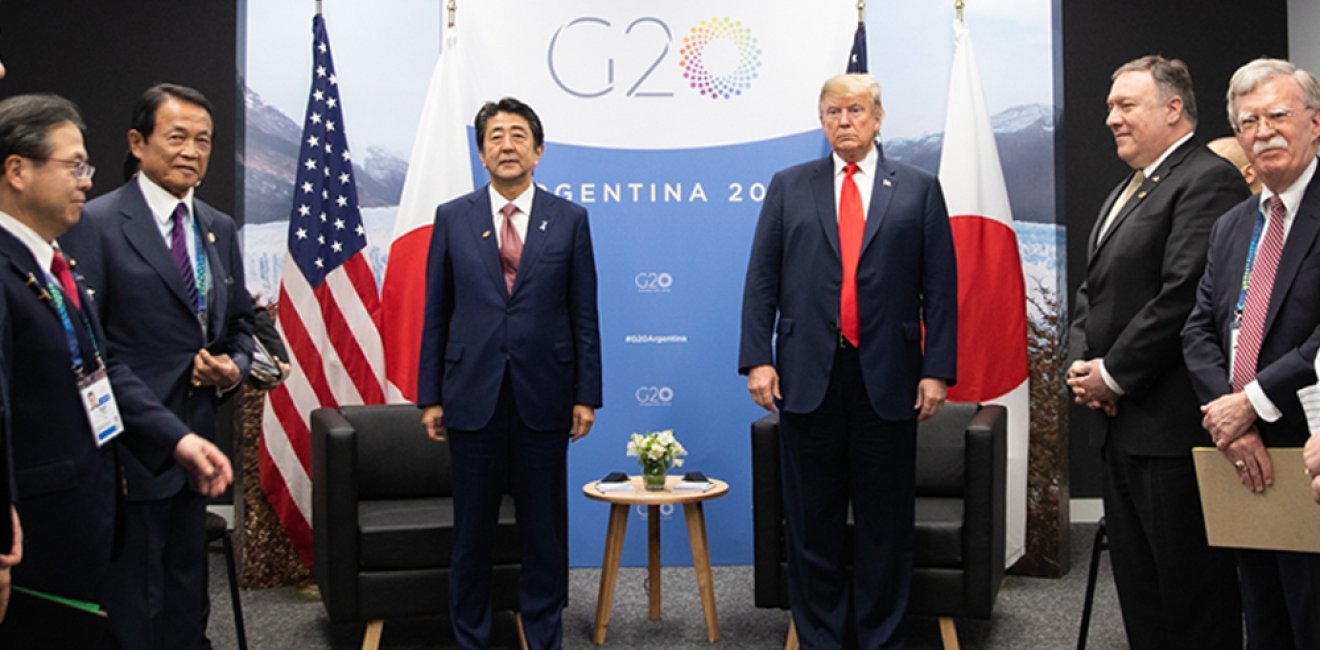
A blog of the Indo-Pacific Program
President Trump and Japanese Prime Minister Abe’s recent meeting in Buenos Aires on the sidelines of the G-20 presented an image of two allies pleased with the progress they had made. The President praised Japan for reducing the bilateral trade deficit and for making significant military acquisitions from the United States. Yet looking ahead, Alliance managers on both sides should be concerned about several issues that threaten to shake up this close and critical relationship.
Most pressing is the issue of North Korea. A year ago, Tokyo was nervous that President Trump’s previous “fire and fury” rhetoric could lead to a large-scale military conflict on the Korean peninsula. Today–although the potential for war has been replaced by remarkable summitry, “love letters,” and the potential for inter-Korean peace–Tokyo is as nervous as ever. This is because North Korea continues to produce nuclear weapons and ballistic missiles, and President Trump seems willing to overlook these continued violations of international sanctions. Some of Japan’s leaders believe this signals Washington’s implicit acceptance of North Korea as a de facto nuclear power, which they fear could eventually limit the willingness of the United States to come to the defense of Japan in a crisis with North Korea.
President Trump has made no secret of his concerns that Japan’s trade arrangements with the United States are exploitative and unfair.
Secondly, some in Tokyo are concerned that Japan may be “next” now that negotiations to replace NAFTA with the USMCA have been concluded. President Trump has made no secret of his concerns that Japan’s trade arrangements with the United States are exploitative and unfair, and may now focus on Japan as the newest economic challenge to conquer. While some in Tokyo have taken heart that China seems to be captivating the president’s attention for now, others fear that the president may see Japan as a more tempting target because he has more leverage over Tokyo than he does over Beijing. This is especially true in the automotive market, although Japan may be somewhat inoculated on that front because many of its car manufacturers have factories in the United States.
Finally, the issue of U.S. military presence in Okinawa has the potential to return to the fore. Three months ago, Okinawa elected a new Governor who opposes the large U.S. military footprint on the island. This will complicate plans by Washington and Tokyo to realign U.S. basing on the island, which in recent years had made significant progress toward completion. In late February, Okinawa will hold a referendum on the relocation of a U.S. base that is critical to the overall realignment plan. The referendum, if successful, will give the new Governor an explicit mandate to oppose Tokyo and Washington. While not legally binding, a successful referendum may diminish Tokyo’s willingness to move ahead with realignment and throw the decades-old realignment plan into doubt.
...as with any relationship, continued success will require careful attention.
The Alliance with Japan is one of the United States’ most valuable and robust. Our interests and values are closely aligned, and the personal connections between the two nations is difficult to overestimate. Yet, as with any relationship, continued success will require careful attention. Looking ahead, it would be prudent for Alliance managers on each side to address these issues directly and carefully before they threaten to upset the broader relationship.
Follow Abraham Denmark, director of the Asia Program, on Twitter @AbeDenmark.
The views expressed are the author's alone, and do not represent the views of the U.S. Government or the Wilson Center. Copyright 2018, Asia Program. All rights reserved.
Author


Indo-Pacific Program
The Indo-Pacific Program promotes policy debate and intellectual discussions on US interests in the Asia-Pacific as well as political, economic, security, and social issues relating to the world’s most populous and economically dynamic region. Read more





